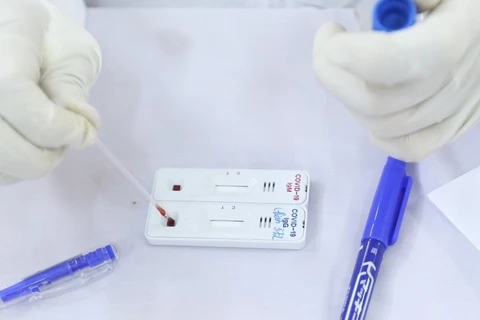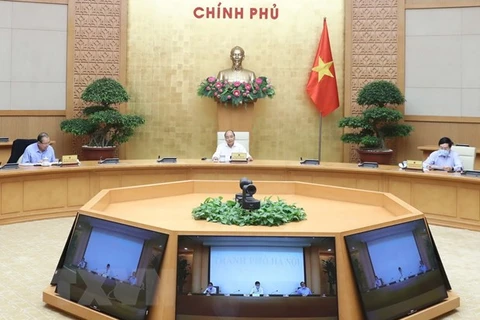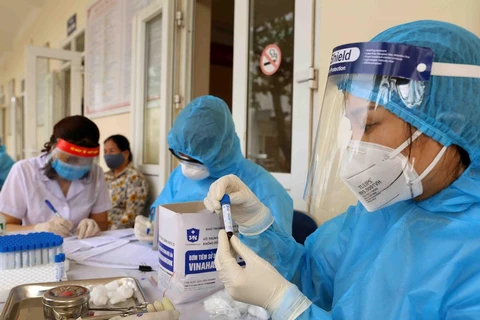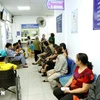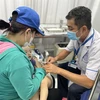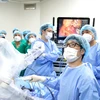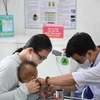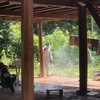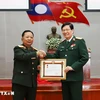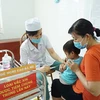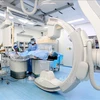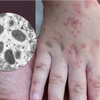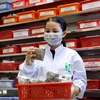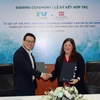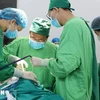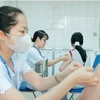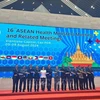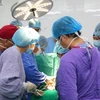Hanoi (VNA) - As the COVID-19 pandemic continues to develop, the use of the plasma taken from recovered COVID-19 patients will be considered and taken as a potential therapy.
On April 24, Associate Professor Luong Ngoc Khue, Director of the Examination and Treatment Department, Deputy Head of the Treatment Sub-Committee of the National Steering Committee on COVID-19 Prevention and Control, said the Ministry of Health will be implementing the therapy using plasma to cure COVID-19.
Information was revealed as the Director presided over a meeting of the council of experts working on the project.
On April 8 the department issued Circular 464/KCB-QLCL&CDT, asking the Central Institute of Hematology and Blood Transfusion and the National Hospital of Tropical Diseases to draft temporary guidelines on the reception and use of plasma to cure COVID-19.
Under the draft, the director of the institute will serve as the coordinator to work with relevant entities in building the guidelines and receive, store, preserve and transport plasma from recovered COVID-19 patients. Meanwhile, the director of the hospital will coordinate with relevant establishments to build the guidelines on the use of plasma received from recovered COVID-19 patients to cure more severe patients.
 Associate Professor Luong Ngoc Khue, Director of the Examination and Treatment Department (Photo: VietnamPlus)
Associate Professor Luong Ngoc Khue, Director of the Examination and Treatment Department (Photo: VietnamPlus) Associate Professor Khue stated that finding a cure for COVID-19 in Vietnam and the rest of the world is difficult due to the absence of relevant drugs and vaccines. “Everything is in the research and development process as we search of a way out,” he added.
The department and the council often update and refer to the research and experimentation of the therapies by other countries. Using plasma to cure COVID-19 is an experiment that is being undertaken by the world. Vietnam is taking the same route.
By now, Vietnam has successfully treated 225 out of the 270 COVID-19 patients, 5 of whom were severe cases. There have been no deaths.
According to experts, as the COVID-19 pandemic develops with various complexities, the use of plasma from cured patients should be considered and taken as a new and potential therapy, to arm physicians with an additional tool to treat patients, especially severe cases. The most important point in the guidelines is the selection of the plasma donors and the use of the material.
Ensuring the safety of the donation of plasma from cured COVID-19 patients is a top priority for the prevention the infection of SARS-COV-2, as well as other disease-causing factors to patients, physicians and the whole community.
Associate Professor Khue said that, under the direction by the national steering committee and leading officials of the ministry, on the basis of scientific documents and articles by foreign experts, as well as the International Society of Blood Transfusion, the Ministry of Health should be an early implementer of the temporary guidelines.
The department is currently assigning four hospitals these guidelines for treating severe patients. These are: the National Hospital of Tropical Diseases; the Hue Central Hospital, the Cho Ray Hospital and the Ho Chi Minh City Hospital of Tropical diseases. In the immediate future, the extraction of plasma is assigned on major centres with top-level experts like the Institute of Hematology and Blood Transfusion, Cho Ray Hospital, and the Hematology and Blood Transfusion Hospital in Ho Chi Minh City.
The assigned units must work closely with the National Institute of Hygiene and Epidemiology as well as Pasteur Institutes to ensure the correct plasma extraction procedures are followed, as well as the correct content of antibodies.
The units joining the work must ensure biological safety in every step and provide incentives to encourage donors.
According to Associate Professor Khue, temporary as they are, the guidelines must ensure the principles of scientific nature and safety for patients.
The department will work to coordinate relevant units in the implementation of those guidelines once they are officially approved by leading officials in the Ministry of Health./.

